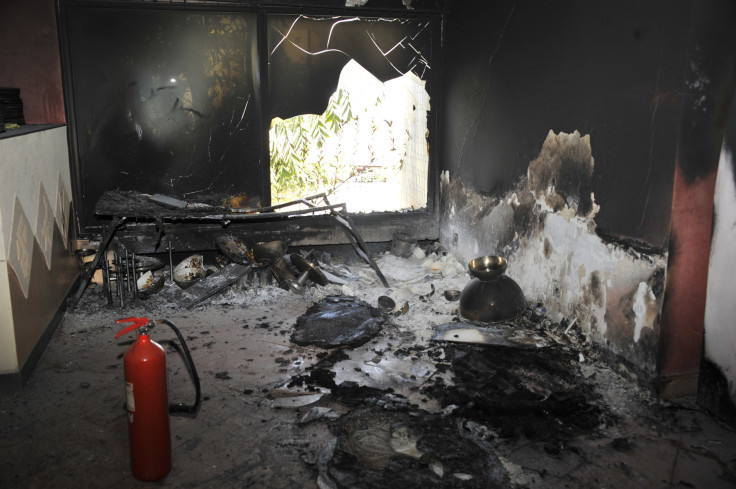Russian President Vladimir Putin Seeks Global Anti-Terrorism Fight After 19 Killed In Mali Attack

BAMAKO, Mali (Reuters) -- Russian President Vladimir Putin said Saturday he wanted global cooperation to combat terrorism in the wake of an Islamist militant attack on a luxury hotel in Mali that killed 19 people, including six Russians. Friday's assault came a week after militants killed 130 people in bomb and gun attacks in Paris and three weeks after a Russian airliner was downed over Egypt's Sinai Peninsula by what Moscow and Western governments say was a bomb, killing 224 all people aboard. The Islamic State group claimed responsibility in both cases.
The bloodshed at the Radisson Blu hotel in Mali, a former French colony, evoked the problems French troops and United Nations peacekeepers face in restoring security and order in a West African state that has battled rebels and militants in its weakly governed desert north for years.
Jihadi groups Al Mourabitoun and al Qaeda in the Islamic Maghreb (AQIM) claimed responsibility for the attack, which ended when Malian commandos stormed the building and rescued 170 people, many of them foreigners.
President Ibrahim Boubacar Keita said two militants were killed in the commando operation. His government increased security at strategic points around Bamako at the start of a declared 10-day state of emergency. "Mali will not shut down because of this attack. Paris and New York were not shut down, and Mali won't be. Terrorism will not win," Keita said during a visit to the hotel Saturday.
Six employees of Russian regional airline Volga-Dnepr were killed, Russia's foreign ministry said, while six others were rescued.
Putin sent a telegram of condolences to Keita and said "the widest international cooperation" was needed to confront global terrorism, according to a statement by the Kremlin.
Tuesday, Putin pledged to hunt down militants responsible for blowing up the airliner, as well as intensified airstrikes against militants in Syria, after the Kremlin concluded a bomb had destroyed the plane.
Putin and French President Francois Hollande also spoke by phone Tuesday and agreed to boost coordination of their military actions in fighting jihadi militants in Syria.
Chinese President Xi Jinping condemned the "cruel and savage" attack, whose dead included three Chinese executives of a state-run railway firm. "China will strengthen cooperation with the international community, resolutely crack down on violent terrorist operations that devastate innocent lives and safeguard world peace and security," the Chinese Foreign Ministry quoted Xi as saying in a statement on its website.
One American and a deputy from a regional parliament in Belgium were also killed in the Bamako hotel attack, although French Defense Minister Jean-Yves Le Drian said he was not aware of any French nationals killed.
Fleeing In Terror
The attack began Friday at 7 a.m. local time when gunmen killed guards at the entrance of the hotel and barged inside.
Malian commandos subsequently stormed the hotel and rescued about 170 people, many of whom had been hiding under beds or elsewhere and rushed terrified from the building to safety as shooting continued inside.
By around 4 p.m. the hotel was secured, but Malians awoke Saturday to a sense of shock at the latest high-profile raid by Islamists this year.
"I feel bruised by this atrocious act, which cannot be justified. No nation, no human life deserves such criminal barbarity," said Oumar Fomba, a teacher. "I urge the Malian government to fight more fiercely against terrorism."
In a speech on the sidelines of a summit with Asian nations in Malaysia, U.S. President Barack Obama described the raid in Mali as "another awful reminder of the scourge of terrorism. Once again, this barbarity only stiffens our resolve to meet this challenge. We will stand with the people of Mali as they work to rid their country of terrorists and strengthen their democracy. With allies and partners, the United States will be relentless."
Setback For France
The attack was another jolting setback for France after the shock of the Paris carnage. France has stationed 3,500 troops in northern Mali in an attempt to restore stability after a rebellion in 2012 by ethnic Tuaregs that was later hijacked by jihadis linked to al Qaeda.
"We [France] have proved to be as blind as the Malian elite. Nothing changes in Mali. The elite continues to act like it always has, as does the international community," said Laurent Bigot, former undersecretary in charge of West Africa at France's foreign ministry, alluding to U.N. peacekeepers. "People have been ringing the alarm bell for a long time, but it doesn't do any good," Bigot, who now works as a consultant, told Reuters.
The attack also refocused attention on a veteran leader of Al Mourabitoun, Mokhtar Belmokhtar, a few months after unconfirmed reports that he was killed in an airstrike.
Northern Mali was occupied by Islamist fighters, some with links to al Qaeda, for most of 2012. They were driven out by a French-led military operation, but violence has continued.
Al Mourabitoun has claimed responsibility for a number of attacks, including an assault on a hotel in the town of Sevare, 375 miles northeast of Bamako, in August that killed 17 people, including five U.N. staff members.
Belmokhtar is blamed for a large-scale assault on an Algerian gas field in 2013 and is a major figure in insurgencies across North Africa.
In the wake of the Paris attacks, an Islamic State group militant in Syria told Reuters the organization viewed France's military intervention in Mali as another reason to target France and French interests.
(Reporting by Tiemoko Diallo and Adama Diarra; Additional reporting by Joe Penney in Bamako, John Irish in Paris, Jason Bush in Moscow and Michael Martina in Beijing; Writing by Matthew Mpoke Bigg; Editing by Mark Heinrich)
© Copyright Thomson Reuters {{Year}}. All rights reserved.





















